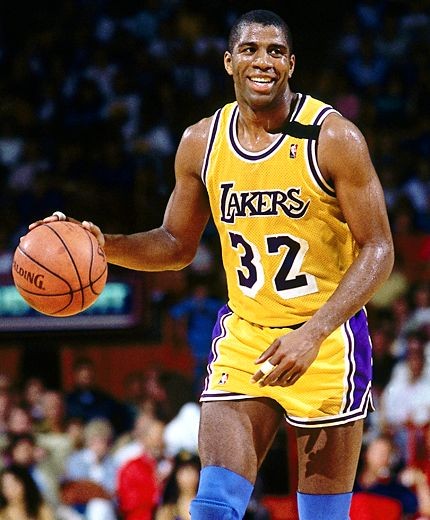There’s a long-held belief among NBA followers that a team cannot win a championship without a bankable, Grade-A superstar. In a league that thrives on the marketability of individual stars (sometimes at the expense of successful teams), can a club reach the mountaintop without a face selling sneakers in Times Square? Can a team built on the grit of collective effort and the grind of defensive play wear the crown?
Before we go any further, let’s define an NBA superstar with as close to an objective method as possible. For this discussion, a “superstar” is a player who has earned first-team All-NBA honors at least twice. There were 11 such NBA players active in the 2012-13 season: Kobe Bryant, Tim Duncan, Kevin Durant, Kevin Garnett, Dwight Howard, LeBron James, Jason Kidd, Steve Nash, Dirk Nowitzki, Chris Paul, and Dwyane Wade. Seven of these 11 players have indeed won championships. (The four who haven’t: Durant, Howard, Nash, and Paul.)

Magic Johnson
Since the Los Angeles Lakers won the 1980 championship — led by a precocious rookie point guard named Magic Johnson — 33 teams have raised the Larry O’Brien Trophy and 32 of them have featured at least one superstar. If you adhere to these odds, it stands to reason a superstar is a prerequisite for a title. Which means only four of the eight teams still alive in the 2013 playoffs have legitimate hope for a mid-June ring-fitting: Miami (with James and Wade), San Antonio (with Duncan), Oklahoma City (with Durant), and New York (with a past-his-prime Kidd).
But then we have the 2003-04 Detroit Pistons, the one team that broke this apparent rule of superstardom. (Cue up Jim Carrey to Lauren Holly in Dumb and Dumber: “So you’re saying I have a chance!!”) Those Pistons featured a second-year forward by the name of Tayshaun Prince. Their starting lineup included four more “good-but-not-greats”: Chauncey Billups, Rip Hamilton, Rasheed Wallace, and Ben Wallace (a four-time Defensive Player of the Year). They may not have been Madison Avenue’s favorite team, but they won a championship by stifling opponents with defense (ranking second in the league in both points allowed per game and per 100 possessions). Perhaps best of all, the 2003-04 Pistons beat a team in the Finals (the Lakers) that featured no fewer than four superstars: Shaquille O’Neal, Kobe Bryant, Karl Malone, and Gary Payton. If you’re counting the chances of a title for this year’s Memphis Grizzlies, thank the basketball gods for the 2004 Pistons.
Why is a superstar so essential to an NBA team’s championship hopes? Easy answer: It’s a five-man game. The best hitter in baseball gets no more than one-ninth of his team’s at-bats. Tom Brady has won a lot of football games, but requires at least a competent New England Patriot defense to reach the Super Bowl. The face of the National Hockey League — Pittsburgh’s Sidney Crosby — averaged 21 minutes on the ice this season, essentially one third of a 60-minute game. But if the Miami Heat so choose, James can play all 48 minutes and touch the ball on every possession. An NBA superstar can make the impact he chooses to make . . . not merely the impact his game allows him to make.
Which brings us to the 2012-13 Memphis Grizzlies, safely into the second round of the playoffs but now confronting a team with that superstar component still unseen in Beale Street Blue. How will this collision of opposites play out?
Case 1 — Among basketball’s modern metrics is the plus-minus rating, a figure that represents the scoring margin between a player’s team and its opponent when that player is on the court. (Many hockey fans consider the NHL’s plus-minus leader every bit as valuable as the league’s top goal scorer.) Here are superstar Chris Paul’s plus-minus figures over the last four games of the Clippers’ series with Memphis: -19, -21, -6, -10. The Grizzlies won all four of those games, of course. The team without a superstar was, on average, 14 points better than the team with the headliner.
Case 2 — Ah, then there’s the opening game between the Griz and Thunder. If ever a playoff game has been won by a single player, you saw it Sunday. Remove Kevin Durant’s stat line and Oklahoma City shot 37 percent and grabbed a total of 28 rebounds. But their superstar made 13 of 26 shots from the field, pulled down 15 boards, and scored 35 points, including the last four. Durant was merely +2 for the game. The Thunder’s plus-minus stars were Kevin Martin and Derek Fisher (each +14). The will and supreme talents of one player were enough to outshine a Grizzlies team good enough to lead by nine points after three quarters. The smartest Memphis strategy may be to squeeze the impact of Martin, Fisher, and the rest of OKC’s supporting cast, knowing Durant will do what superstars do.
Can an NBA title be won without a superstar? There are four teams left to show us the way.